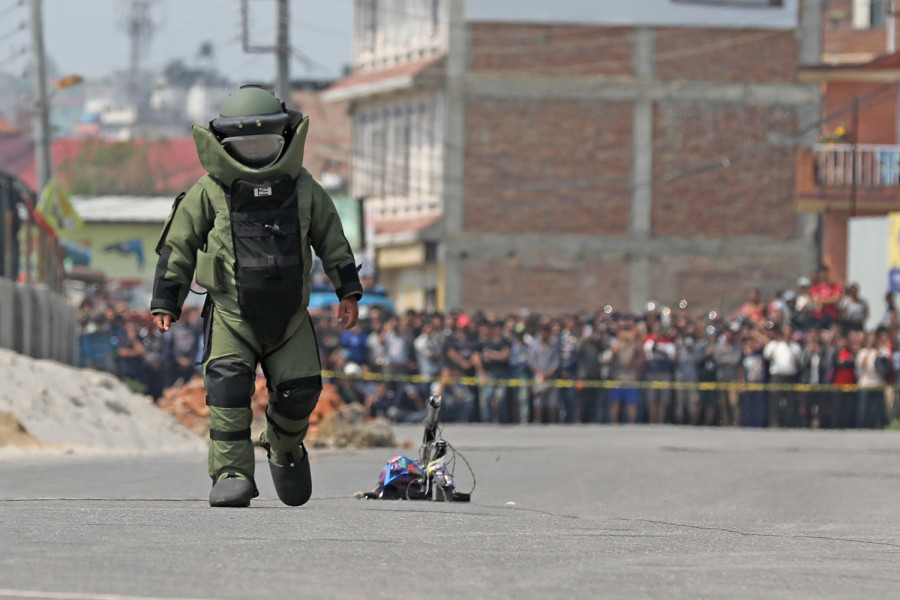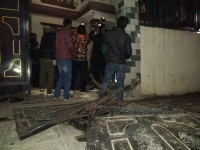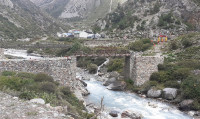National Security
Sunday’s blasts indicative of an intelligence failure, analysts say
Though security officials said they were aware of possible violent activities, they failed to prevent a series of explosions that killed four people.
Anil Giri
Two deadly explosions that killed four persons in the Capital on Sunday have raised serious concerns over a possible intelligence failure in the KP Sharma Oli administration’s security apparatus.
The Netra Bikram Chand-led Communist Party of Nepal is believed to be behind Sunday’s blasts, which, according to police, were accidental. CPN cadres were attempting to rig cooking gas cylinders as explosives when the cylinders exploded, according to police. These blasts come amid the administration’s continued assurance that it has largely reined in the Chand party.
“Multiple blasts on Sunday suggest a complete failure of the security agencies,” said Geja Sharma Wagle, a security analyst.
The explosions, which took place in Sukedhara and Ghattekulo in Kathmandu, occurred just a day ahead of a nationwide strike called by the Chand-led outfit, demanding an investigation into the death of its cadre, Tirtha Raj Ghimire.
Ghimire, who had sustained injuries in police firing in Bhojpur, died while undergoing treatment at the BP Koirala Institute of Health Sciences last week.
Sunday’s blasts come on the heels of two more incidents for which the Chand party has taken responsibility. In February, an explosion in Nakkhu killed one and injured two others. Again, in March, the party carried out a blast in Basundhara, after which the government banned the Communist Party of Nepal, branding it a criminal outfit.
The authorities had also claimed, time and again, that they were well aware of Chand’s activities and that the party would “soon come to the negotiating table”.
On Monday, Home Minister Ram Bahadur Thapa told Parliament the government had intelligence that the Chand party has created four militant wings and formed a parallel ‘people’s government’.
[Read: Home Minister says those killed in blasts were not citizens, angering opposition]
“If the government knew the Chand-led outfit has formed a people’s government, has four militant groups and was planning to target the Valley, then what were the security agencies doing?” Wagle wondered.
Security experts also questioned the role of the National Intelligence Department, the country’s main intelligence agency, especially since it was brought under the Prime Minister’s Office last year.
Apart from the Intelligence Department, the other three security agencies—Nepal Army, Armed Police Force and Nepal Police—also have their own intelligence gathering units and dedicated wings.
Two senior security officials told the Post that even as these security agencies were expecting some kind of action from the Chand outfit after the arrest of its leaders, including Hemanta Prakash Oli, they did not expect them to be as violent as Sunday’s.
“Since the outfit had been targeting some multinational companies, including Ncell towers, there were concerns whether such sporadic incidents could happen,” a senior security official told the Post on condition of anonymity citing the sensitivity of the matter.
“During an emergency security meeting held after the explosions yesterday, we had briefed the same,” said the official.
But security analysts called Sunday’s incidents were the culmination of a series of lapses.
“The security agencies have failed in intelligence gathering, sharing and analysis,” said Binoj Basnyat, a former Nepal Army officer.
The Chand party had, at its Central Committee meeting in Ilam in April, decided to retaliate against the government for its arrest of Hemanta Oli, a party central commander.
According to Basnyat, the government’s approach to dealing with the Chand outfit is faulty. “Chand’s activities have both political and security dimensions and the government needs to deal with the party accordingly,” Basnyat told the Post.
There were other dimensions at work here, including geopolitical realities, ill-governance, high unemployment rate, and dissatisfied youths, all of which the government had failed to take into consideration while banning the Chand outfit, according to Basnyat.
The government, however, said there were no security lapses. Ram Krishna Subedi, the Home Ministry spokesperson, told the Post that all the security agencies were working in a coordinated manner to deal with “sensitive issues of national security.”
“It’s wrong to blame a particular institution in the aftermath of an incident like this,” Subedi told the Post. He, however, declined to share the kind of inputs the security agencies had received. Instead, he censured the owner of the house where one of the explosions took place.
“The house owner should know who the tenants are and what they do,” Subedi said in response to the Post’s question on the explosion in a residential Ghattekulo building, just a few hundred metres from Singha Durbar, the country’s administrative nerve centre. “Since it is private property, the security agencies are mindful of individual rights.”




 23.12°C Kathmandu
23.12°C Kathmandu










